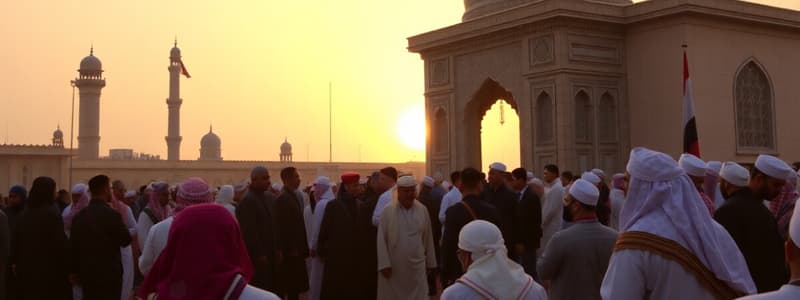Podcast
Questions and Answers
What is one of the significant characteristics of the relationship between Islam and local traditions in sub-Saharan Africa and Southeast Asia?
What is one of the significant characteristics of the relationship between Islam and local traditions in sub-Saharan Africa and Southeast Asia?
- Islam disregarded the local customs entirely.
- Islam completely replaced local traditions.
- Islam spread only through military conquest.
- Islam blended with local traditions through peaceful means. (correct)
Which of the following movements emphasizes the importance of love for God over traditional rituals and caste distinctions?
Which of the following movements emphasizes the importance of love for God over traditional rituals and caste distinctions?
- Bhakti movement (correct)
- Sikhism
- Neo-Confucianism
- Taki Onqoy
What was the primary success of the First Crusade as organized by Pope Urban II?
What was the primary success of the First Crusade as organized by Pope Urban II?
- Promoting trade relations in the Middle East.
- Establishing a lasting peace between Christians and Muslims.
- Recovering Jerusalem and expanding Christian territory. (correct)
- Reviving the Byzantine Empire without territorial gains.
What phenomenon reflects the merging of African and Asian religious practices with Christianity in the Americas?
What phenomenon reflects the merging of African and Asian religious practices with Christianity in the Americas?
Which of the following accurately describes the Neo-Confucianism movement?
Which of the following accurately describes the Neo-Confucianism movement?
What significant event led to the election of multiple rival popes in the history of the Roman Church?
What significant event led to the election of multiple rival popes in the history of the Roman Church?
Which movement aimed to reaffirm Catholic doctrines in response to Protestantism?
Which movement aimed to reaffirm Catholic doctrines in response to Protestantism?
What was the primary outcome of the Council of Constance?
What was the primary outcome of the Council of Constance?
What characterized the cultural blending seen in missionary activities during colonization?
What characterized the cultural blending seen in missionary activities during colonization?
Which of the following best describes the impact of the Protestant Reformation?
Which of the following best describes the impact of the Protestant Reformation?
Who were the New England Puritans?
Who were the New England Puritans?
Which event marks a significant political revolution that impacted modern democracies?
Which event marks a significant political revolution that impacted modern democracies?
What was the main consequence of the expansion of Christianity influenced by colonialism?
What was the main consequence of the expansion of Christianity influenced by colonialism?
What movement sought to return to the purest form of Islam in the 18th century?
What movement sought to return to the purest form of Islam in the 18th century?
Which of the following is not one of the 5 pillars of Islam?
Which of the following is not one of the 5 pillars of Islam?
What was a significant disagreement that led to the Sunni - Shi'a schism in Islam?
What was a significant disagreement that led to the Sunni - Shi'a schism in Islam?
In which region did Wahhabi Islam primarily originate?
In which region did Wahhabi Islam primarily originate?
What does the term 'Koran' refer to in Islam?
What does the term 'Koran' refer to in Islam?
How does Islam view its transition from polytheism to monotheism?
How does Islam view its transition from polytheism to monotheism?
Which group within Islam elects a leader as a caliph?
Which group within Islam elects a leader as a caliph?
What is a primary focus of the 5 pillars of Islam?
What is a primary focus of the 5 pillars of Islam?
What does the term 'economic imperialism' refer to?
What does the term 'economic imperialism' refer to?
Which of the following factors contributed to China's decline of power in the 19th century?
Which of the following factors contributed to China's decline of power in the 19th century?
What impact did the opium trade have on Chinese society?
What impact did the opium trade have on Chinese society?
What was the main goal of the self-strengthening movement in China?
What was the main goal of the self-strengthening movement in China?
What characterized the Taiping Uprising in China during the 19th century?
What characterized the Taiping Uprising in China during the 19th century?
Which Enlightenment principles influenced the Atlantic revolutions?
Which Enlightenment principles influenced the Atlantic revolutions?
What was the primary goal of the American Revolution compared to the French Revolution?
What was the primary goal of the American Revolution compared to the French Revolution?
What unique aspect distinguished the Haitian Revolution from the other Atlantic Revolutions?
What unique aspect distinguished the Haitian Revolution from the other Atlantic Revolutions?
What was one of the major failures of Napoléon during his expansion of Le Grand Empire?
What was one of the major failures of Napoléon during his expansion of Le Grand Empire?
Which of the following elements was integrated into the Napoleonic Code?
Which of the following elements was integrated into the Napoleonic Code?
What was a significant consequence of Napoléon's conquests in Europe?
What was a significant consequence of Napoléon's conquests in Europe?
What was a key demand of 19th-century reform movements related to suffrage?
What was a key demand of 19th-century reform movements related to suffrage?
What does maternal feminism advocate for?
What does maternal feminism advocate for?
Flashcards are hidden until you start studying
Study Notes
The Development of Islam
- Wahhabi Islam: 18th century Islamic reform movement advocating a return to the purest form of Islam
- Started in the Arabian Peninsula, founded by Muhammad
- Key beliefs: Monotheism (Allah), importance of unity, 5 pillars of Islam:
- Profession of faith
- Prayer 5 times a day
- Fasting during Ramadan
- Pilgrimage to Mecca
- Charity to the poor
- Expansion across the Roman Empire (Al-Andalus), spreading cultural influence as well as religious
- Sunni-Shi'a schism: Disagreement over leadership after Muhammad, Sunni: elected abu Bakr as caliph, Shia: designate Ali as imam
- Caliphate: A community of Islamic expansion
- Muslim-Christian relations: Both share beliefs in last judgement, resurrection, Jesus, and the Trinity
Persistence and Change in Afro-Asian Traditions
- Cultural blending: African and Asian religious practices persisted and adapted through syncretism with Christianity, forming new religions like Vodou and Santeria
- Islamic Influence: Spread peacefully in sub-Saharan Africa and Southeast Asia, often blending with local traditions
- Resilience and Adaptation: Local traditions maintained significance, adapting to incorporate new elements while resisting erasure
- Taki Onqoy: Indigenous Peruvian revival movement opposing Spanish colonization and Christianization in the 16th century
- Neo-Confucianism: Revival of Confucian thought in China blending with Buddhism and Daoism during the Song Dynasty
- Bhakti movement: Hindu devotional movement emphasizing love for God over ritual and caste distinctions
- Sikhism: Monotheistic religion founded in India blending elements of Hinduism and Islam, originating in the 15th century
The Development of the Christian Church
The Crusades
- Pope Urban II called for Christians to go to war as an opportunity to expand Christian territory and restore the Byzantine Empire after the Great Schism
- First Crusade: The only successful crusade, using feudalism to regain Jerusalem
- Consequences:
- Positive: More commercial exchange, discovery of eastern products, trade routes (especially in Italy), better science, rediscovery of Greek and Roman masterpieces
- Negative: Nobles ruined, disaster for Jewish-Christian relations, growth of monarchies, papacy loses prestige
The Great Schism of the West
- Political conflict in the Roman church, culminating in two competing popes: Urban VI and Clement VII, both refusing to step down
- Council of Constance: Both sets of cardinals negotiated and dismissed both popes, electing Martin V as the new pope
Globalization of Christianity
- Expansion: Spread from its Middle Eastern roots to Europe, the Americas, Africa, and Asia, heavily influenced by colonialism
- Protestant Reformation: Initiated significant theological and political changes in the 16th century, creating various denominations and conflicts (e.g., Thirty Years' War)
- Counter-Reformation: Catholic Church's response to Protestantism, aiming to reaffirm doctrines and address abuses, resulting in the establishment of the Jesuits and increased missionary activity
- Cultural Syncretism: Indigenous cultures blended with Christianity in new regions, resulting in unique expressions of the faith
- Catholic Missionaries: Priests sent by European empires to spread Catholicism during colonization
- Jesuits in China: Catholic missionaries who integrated into Chinese culture to spread Christianity in the 16th-17th centuries
- New England Puritans: Protestant settlers in 17th century America aiming to build a model Christian society
- The Second Agricultural Revolution
- The Black Death
- Hundred Years' War
- War of the Roses
- Renaissance and the Age of Discovery
- The Unification of Spain
- The Age of Reformation
Political Revolutions
- The Glorious Revolution
- The American Revolution
- The French Revolution
Third Estate
- The commoner class in pre-revolutionary France, representing the vast majority of the population
Atlantic Revolutions in a Global Context/Comparing Atlantic Revolutions
- Enlightenment Ideals: The revolutions were influenced by Enlightenment principles of liberty, equality, and popular sovereignty
- Diverse Outcomes:
- American Revolution: Sought independence without radical social change
- French Revolution: Aimed for significant societal transformation, including the abolition of feudal privileges
- Haitian Revolution: Unique as a successful slave revolt, leading to the establishment of Haiti as the first independent black republic and influencing other movements
Napoleon and Le Grand Empire
- Coup d'état against the Directory, ending the era of revolution
- Napoleon possessed charisma and people skills, gaining support
- Domestic issues: Napoleonic Code (reforming 300 laws into 7 codes), equality of citizens before the law, protection of property rights, toleration of religion, abolition of feudalism, creation of the Bank of France
- Le Grand Empire: Expansion of territory, seen as a threat to European territories
- Napoleon's failure due to:
- Great Britain's survival with a continental blockade, making them more powerful
- Forces of nationalism, other nations building national pride, which was detrimental
- Invasion of Russia in winter: Killing ⅘ soldiers, Russia burning everything behind them, leaving French soldiers with no food or shelter
- Napoleon’s Influence: His conquests spread revolutionary ideals but also led to a backlash, as various regions sought to re-establish order after his fall
Nationalism & Feminism
- Suffrage: The right to vote, a key demand in many 19th century reform movements
- Maternal Feminism: A movement arguing for women's political rights based on their role as mothers and moral guardians
Echoes of Revolution
- Global Impact: The Atlantic Revolutions inspired movements for independence and social reform worldwide, spreading ideas of equality and democracy
- Economic Imperialism: Domination of weaker economies by more powerful nations through economic means
- Civilizing Mission: The belief that European imperial powers had a duty to "civilize" colonized peoples through religion and western values
Reversal of Fortune: China's Century of Crisis
- Decline of Power: China faced internal crises (overpopulation, revolts) and external pressures (Opium Wars) that weakened its sovereignty
- Opium Trade Impact: The illegal opium trade significantly undermined Chinese society and economy, contributing to wars and "unequal treaties" ceding control to foreign powers
- Failed Modernization: Efforts to modernize, such as the self-strengthening movement, were insufficient to address internal and external challenges, contributing to the Qing Dynasty's collapse in 1912
- Taiping Uprising: A massive 19th century Chinese rebellion led by a Christian-inspired movement against the Qing Dynasty
- Opium Wars: Conflicts between Britain and China over British trade in opium and Chinese sovereignty
- Self-Strengthening: Chinese reform movement in the late 19th century aimed at modernizing the military and industry to resist Western powers
Studying That Suits You
Use AI to generate personalized quizzes and flashcards to suit your learning preferences.




